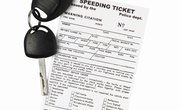
Even the safest drivers may fail to come to a complete stop at a stop sign now and then or may even miss a stop sign when driving on an unfamiliar road. If you're cited for a stop sign violation, it could affect how much you pay for car insurance. A number of factors can influence whether you can expect a premium increase for the infraction.
Moving Violation
Running a stop sign is considered a moving violation, along with infractions such as speeding, failing to yield or running a red light. However, unlike infractions like driving under the influence or reckless driving, it is typically viewed as a minor violation instead of major. Although it is considered more serious than a non-moving occurrence like parking illegally, any moving violation can still impact your driving record and your auto insurance rates.
Insurance Company Rules
Auto insurance companies are typically required to file a rating plan with the insurance department of any state in which they do business. The rating plan indicates the company's policy for how it intends to treat occurrences such as minor violations. In some cases, the company's rating plan allows for forgiveness of a first violation if the policyholder can meet certain criteria, such as being insured by the company for a certain length of time. If forgiveness does not apply, the company may issue a rate increase or surcharge.
Mitigating Factors
If the stop sign violation results in an accident, the situation can be quite different. In most cases, running a stop sign means the driver will be deemed at fault for any ensuing accident. If so, the company is likely to raise the driver's rates by adding an accident surcharge. If the driver has had several at-fault accidents, the result could be the termination of the policy, forcing her to obtain more expensive nonstandard coverage.
Point Accumulation
In some states, the motor vehicle department assesses points for moving violations. An accumulation of points may eventually cause an insurer to raise the driver's rates. If the driver can remain free of additional violations for a specified time frame, the points will drop off his driving record and the insurer may remove any rate increase or surcharge. If the driver successfully completes traffic school or meets other necessary requirements, it can speed up the point removal process.
References
- CheapCarInsuranceQuotes.com: Will My Car Insurance Rates Go Up After One Ticket?
- Virginia Department of Motor Vehicles. "Moving Violations and Point Assessments." Accessed Jan. 24, 2020.
- Insurance.com."Traffic Ticket? How Much Auto Insurance Goes Up for 18 Traffic Violations." Accessed Jan. 24, 2020.
- Insurance.com."Auto Insurance Discounts to Ask For: Complete Guide." Accessed Jan. 24, 2020.
- Insurance.com. "Will an Accident or Ticket Increase My Car Insurance Rate?" Accessed Jan. 24, 2020.
- Insurance.com. "10 Things You Need to Know About Driver’s License Points." Accessed Jan. 24, 2020.
- Nevada Department of Motor Vehicles. "Demerit Point System." Accessed Jan. 24, 2020.
- State of California Department of Motor Vehicles. "What Is a Point?" Accessed Jan. 24, 2020.
- Allstate. "I Got A Speeding Ticket. Will It Affect My Insurance?" Accessed Jan. 24, 2020.
- Geico. "Learn More About Accident Forgiveness." Accessed Jan. 24, 2020.
- Insurance Information Institute. "Is It Legal to Drive Without Insurance?" Accessed Jan. 24, 2020.
- Texas Department of Public Safety. "What Is a Financial Responsibility Insurance Certificate (SR-22)." Accessed Jan. 24, 2020.
Writer Bio
Chris Joseph writes for websites and online publications, covering business and technology. He holds a Bachelor of Science in marketing from York College of Pennsylvania.

